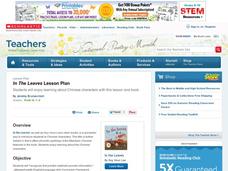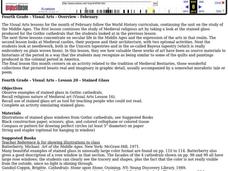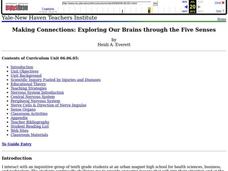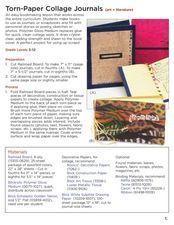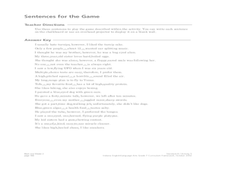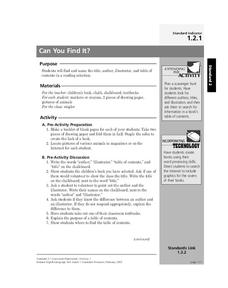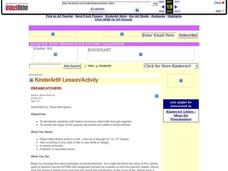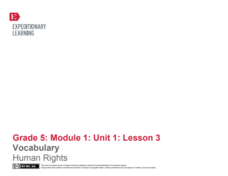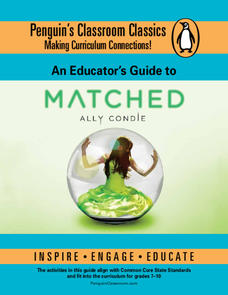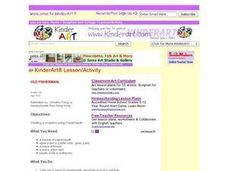Curated OER
Merging Art and Science?
Students approach science through artwork. In this art and science instructional activity students work together to develop theories and gather data.
Curated OER
In The Leaves Lesson Plan
Students are exposed to Chinese characters. In this multicultural early childhood lesson plan, students identify objects by using folding cards which have Chinese characters on one side and the English equivalent on the other.
Curated OER
Visual Arts
Fourth graders study the stained glass produced for the Gothic cathedrals, needlework, castles, and tapestry of the Middle Ages.
Curated OER
Language Arts Writing Experience
Pupils write and illustrate a picture of their favorite food. They describe and practice responsible behaviors for health and safety.
Curated OER
How Do Artists Get Their Ideas? Culture and Environment as Sources of Ideas
Students share the difficulties they have in determining what to write or draw for a project. In groups, they view examples from three different artists and discuss how their personal experiences affected their art. They brainstorm a...
Curated OER
Your Amazing Body
Young scholars examine the different body systems and how they are interdependent on each other. In this body systems lesson plan students draw the body and its parts.
Curated OER
Making Connections: Exploring Our Brains through the Five Senses
Young scholars record observations and create drawings and models of anatomy using their five senses. They describe the structures of a neuron and analyze each of their functions. They compare and contrast the typical structural...
Curated OER
Making Connections: Exploring Our Brains through the Five Senses
Students identify structures of the brain, and neurons and analyze their functions. In this nervous system lesson students create drawings and models of anatomy.
Sargent Art
Metal Embossing Weathervanes
Metal work has been used for hundreds of years. Ninth graders get a chance to experience the artistry of metal embossing in this highly structured lesson. Each step is accented with a helpful image and related instruction. The end...
Penguin Books
An Educators' Guide to Between Shades of Gray by Ruta Sepetys
Books can help teens understand complex global issues. A helpful educator's guide introduces readers to what it's like to be a refugee. Lesson components for the novel Shades of Gray include an anticipation guide and writing and research...
National Mississippi River Museum & Aquarium
Sun Printing
Ozalid acid paper is sensitive to the light. It reacts by getting darker, and it's the same paper photographers use when they print their pictures. Here, kids get to use photo-sensitive paper to create sun prints to find out how useful...
Curated OER
Torn Paper Collage Books
An excellent lesson on bookmaking awaits your students! This simple, and easy-to-implement plan should provide you with some excellent student-made products that you'll be proud to send home with them. The instructions are clear, and the...
Curated OER
Punctuation Game
Students identify and use hyphens, dashes, and semicolons. Using teacher created cards, they correct sentences written on the board by the instructor.
Curated OER
Can You Find It?
Plan a Parts of a Book scavenger hunt. Begin by giving your young adventurers a book, and asking them to find the title, author, illustrator, and table of contents. After a discussion of the purpose of each of these items, class members...
Curated OER
Dreamcatchers
After reading a Native American legend about dreamcatchers, why not make some. This resource provides several good links that explain the legend of the dreamcatcher and step-by-step instructions for making them with the class. Tip: If...
National Endowment for the Humanities
Mark Twain and American Humor
“The Celebrated Jumping Frog of Calaveras County” is famous, in part, because it established a uniquely American form of humor. For this famous story, Mark Twain combines the tall-tale, the dialect story, and satire. Here is a resource...
EngageNY
Vocabulary: Human Rights
Your class continues to explore the history of the Universal Declaration of Human Rights. In addition to learning about the background of this text, learners work on the skill of identifying and understanding key academic vocabulary....
Penguin Books
An Educator's Guide to Matched by Ally Condie
Even supposed Utopian societies have their flaws. Using an educator's guide, individuals explore the society Ally Condie creates in Matched. Reflective writing prompts double as discussion questions and cover key themes in the novel, as...
EngageNY
Clarifying Thinking on Water Management: Revisiting the Gallery Walk
One, two, three, go! Scholars gather in triads and number themselves one to three. Each number is responsible for sharing a section of the map homework completed the night before as learners discuss domain-specific vocabulary terms using...
Curated OER
In Depth with the Full Spectrum
Young scholars explore the basic color wheel and the ways that artists use color to guide the viewer's attention through a painting's composition. A creation of a sense of depth in a two dimensional space and the effect of color on mood...
Curated OER
Old Fisherman
Sculpting is a lot of fun and it stimulates multiple senses at once. Learners observe and then create a fisherman (or any person) out of paper clay. They mold and sculpt their clay until they have shaped a person. They then paint and...
Curated OER
Painting Package
Students use tools in a painting package to design tiles and create repeating patterns. They design a single tile using a 4 x 4 grid and experiment with changing the alignment of some of the tiles by rotating different areas.
Maine Content Literacy Project
Introduction to Ernest Hemingway
What is a white elephant, and what does it have to do with Ernest Hemingway? Study "Hills Like White Elephants" in-depth by following the procedures outlined in this lesson, the fifth in a series of fourteen. Learners start the day with...
Curated OER
Say Hi to Haibun Fun
Students examine the Japanese writing form of Haibun. They identify the elements of Japanese prose and poetry, analyze a haibun for writing devices, complete a graphic organizer, and compose an original haibun as a form of journal keeping.



